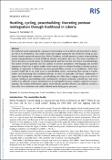Files in this item
Hustling, cycling, peacebuilding : narrating postwar reintegration through livelihood in Liberia
Item metadata
| dc.contributor.author | McMullin, Jaremey R. | |
| dc.date.accessioned | 2022-05-12T14:30:17Z | |
| dc.date.available | 2022-05-12T14:30:17Z | |
| dc.date.issued | 2022-01-01 | |
| dc.identifier | 252057973 | |
| dc.identifier | 6d601bee-1aa4-428f-81d1-c73eca915d6d | |
| dc.identifier | 85107418109 | |
| dc.identifier | 000727550000006 | |
| dc.identifier.citation | McMullin , J R 2022 , ' Hustling, cycling, peacebuilding : narrating postwar reintegration through livelihood in Liberia ' , Review of International Studies , vol. 48 , no. 1 , pp. 67-90 . https://doi.org/10.1017/S0260210521000255 | en |
| dc.identifier.issn | 0260-2105 | |
| dc.identifier.other | RIS: urn:E5D10AE54FF1F5387E3E5D2F241CD713 | |
| dc.identifier.other | RIS: urn:E5D10AE54FF1F5387E3E5D2F241CD713 | |
| dc.identifier.other | ORCID: /0000-0002-0444-3146/work/113060923 | |
| dc.identifier.uri | https://hdl.handle.net/10023/25351 | |
| dc.description | Funding information: The research was supported by a grant from the Scottish Funding Council, Official Development Assistance, Global Challenges Research Fund (SFC ODA GCRF). | en |
| dc.description.abstract | Ex-combatant youth originated the commercial motorcycling sector in Liberia and have played a dominant role in its development. This article collates key insights narrated by one of Liberia’s young ex-combatants-turned-commercial motorcyclists, Edwin Nyankoon, to build narrative accounts of peacebuilding around conceptualisation of youth livelihood, identity, and politics after war. The article contributes to diverse literatures on youth agency by emphasising the need for narrative and subject-led methodologies that anchor research questions and data analysis to research participants’ own language and narrated experiences of post-war. It applies insights about everyday peace to interpret hustling as bottom-up peacebuilding, in opposition to dominant top-down peacebuilding accounts of ex-combatants. These latter accounts largely fail to see youth actors as peacebuilding agents, constructing them instead as troublemakers and interpreting their livelihood activities in terms of criminality and threat. Additionally, it argues that hustling also constitutes a peacebuilding style. More than a coping strategy or an indicator of peace, hustling-as-peacebuilding-style is performative: relational, embodied, contradictory, and recognizable to its adherents as peace-promoting even if (and arguably because) outsiders construct it as peace-negating. This analysis problematises agency, social relations, gendered identity, and collective security as they relate to ex-combatant and conflict-affected youth during peace processes. | |
| dc.format.extent | 24 | |
| dc.format.extent | 246857 | |
| dc.language.iso | eng | |
| dc.relation.ispartof | Review of International Studies | en |
| dc.subject | Ex-Combatant reintegration | en |
| dc.subject | Liberia | en |
| dc.subject | Motorcycling | en |
| dc.subject | Narrative approaches | en |
| dc.subject | Peacebuilding | en |
| dc.subject | Youth | en |
| dc.subject | JZ International relations | en |
| dc.subject | T-NDAS | en |
| dc.subject | SDG 16 - Peace, Justice and Strong Institutions | en |
| dc.subject | MCC | en |
| dc.subject.lcc | JZ | en |
| dc.title | Hustling, cycling, peacebuilding : narrating postwar reintegration through livelihood in Liberia | en |
| dc.type | Journal article | en |
| dc.contributor.sponsor | Scottish Funding Council | en |
| dc.contributor.sponsor | Scottish Funding Council | en |
| dc.contributor.institution | University of St Andrews. School of International Relations | en |
| dc.identifier.doi | 10.1017/S0260210521000255 | |
| dc.description.status | Peer reviewed | en |
| dc.identifier.grantnumber | SFC/AN/12/2017 | en |
| dc.identifier.grantnumber | N/A | en |
This item appears in the following Collection(s)
Items in the St Andrews Research Repository are protected by copyright, with all rights reserved, unless otherwise indicated.

